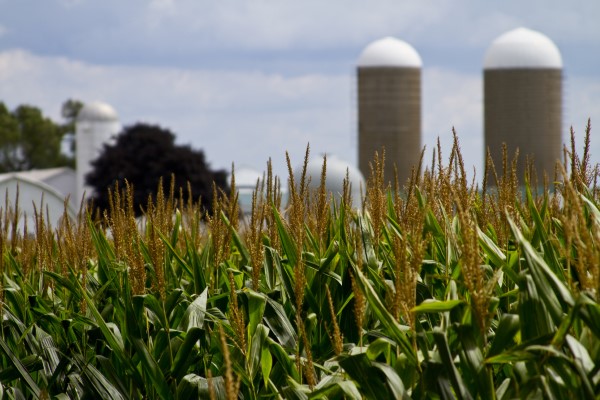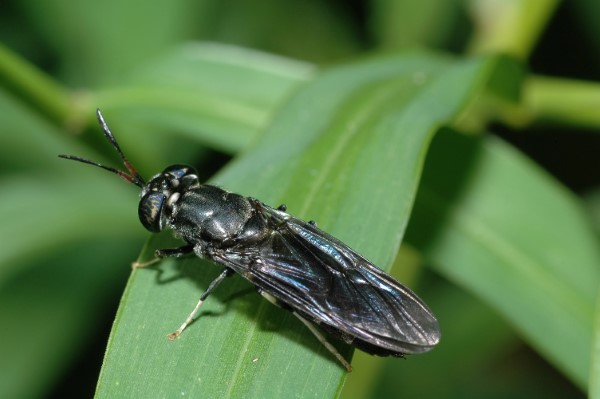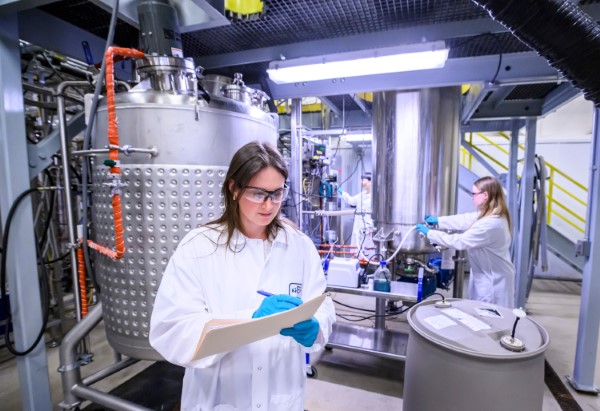When doling out taxpayer dollars under the Biden Administration’s Tech Hubs program, the U.S. Commerce Department is quick to cite the numbers behind its granular vetting process. Of close to 500 coalitions that formed nationwide in hopes of receiving funding under the CHIPS and Science Act, a mere 31 were granted Tech Hub status after an initial knock-out round that concluded in October of 2023. Of those, just 12 — including Illinois’ iFAB Tech Hub — were approved for federal funding, close to $51 million each, as announced to great fanfare in July.
As with iFAB, a biomanufacturing venture led by the University of Illinois Urbana-Champaign and joined by 30 other partners, the Tech Hubs project seeks to supercharge innovation and job creation by wrapping emerging technologies around an outstanding regional asset. For iFAB, that asset is Illinois’ abundance of soybeans and corn, which biomanufacturing processes can convert into a wide range of sustainable alternatives to fuel-based products, including high-value biofuels, pharmaceuticals, food additives, animal-free proteins and cosmetics. Illinois, according to the U.S. Department of Agriculture, led the nation in soybean production and ranked second for corn in 2023, which — combined with the state’s history of agricultural innovation — make iFAB a clear fit as a biotech hub.
“Our program,” said Beth Conerty, iFAB’s regional innovation officer, “is strategically positioned to lead the charge in transforming the bioeconomy. Through iFAB, Illinois is not just participating in biomanufacturing — we are helping to shape the future of the industry.”
In the short time since its foundation, the iFAB consortium of leaders from higher education, economic development organizations, government, industry and labor has secured more than $680 million in cash match and strategic investments. The bulk of the federal Tech Hubs award is to go toward an expansion of Urbana-Champaign’s Integrated Bioprocessing Research Laboratory, which serves as a bridge between basic research and commercial applications of bioproducts. This, for an industry that is projected to reach $200 billion by 2040, with the potential to generate 1 million jobs by 2030.
 2024 corn harvest: 2.27 billion bushels.
2024 corn harvest: 2.27 billion bushels.
Photo from Getty Images/wbrianwatkins
Oh, the Things You Can Do With Corn and Soybeans
Another chunk of the Tech Hubs grant is designated for iFAB member Primient, a top producer of food and industrial ingredients made from renewable, plant-based sources — primarily corn. Headquartered in the Chicago suburb of Schaumburg, Primient employs more than 500 workers at its precision fermentation facility in Decatur.
“The [Tech Hubs] award is a testament to the dedication of the iFAB leadership and partners who had a clear vision from the start,” said Primient CEO Jim Stutelberg. “For Primient, this is the next step in our journey of renewing, modernizing and growing to meet the potential of the bioeconomy.”
Primient’s history in Illinois stretches back to the early 1900s, when it was founded in Decatur as the A.E. Staley Manufacturing Company. In March of 2024, the company announced a five-year, $400 million investment in its Decatur operations, which guarantees its presence in Central Illinois for decades to come.
“Primient’s investment in its Decatur operations reinforces the company’s longstanding position as a community leader and signifies strong confidence in our shared future,” said Julie Wolfe Moore, Decatur’s mayor. “We are proud to partner with them as they lay the foundation for the next generation, ensuring that Decatur is ready to step into the potential of the bioeconomy.”
The versatility of corn and soybeans makes each a crucial component in biomanufacturing. According to the USDA’s most recent annual report, issued in January, Illinois farmers produced a nation-leading 648 million bushels of soybeans in 2023 to go with 2.27 billion bushels of corn, second only to Iowa.
In 2023 — with Gov. JB Pritzker in attendance — soybean processor Incobrasa Industries broke ground on a $250 million expansion of its production facility northwest of Chicago. The expansion includes the construction of an advanced soybean crushing facility, capable of producing soybean meal and husks — both used in animal feed — as well as soybean oil, which has nutritional and industrial applications. The expansion is to create or retain 240 jobs.
Like Primient, Incobrasa received an Economic Development for a Growing Economy (EDGE) tax credit, awarded by the State in conjunction with a minimum capital investment of $155.8 million.
“Because of the EDGE tax credit, we will be able to expand our workforce and our footprint with local farmers,” said Aluizio Ribeiro, Incobrasa’s president and CEO.
 The black soldier fly.
The black soldier fly.
Photo from Getty Images
Enter the Insects
Often mistaken for wasps, Hermetia illlucens — better known as the black soldier fly — is found in cities, fields and forests over most of America. And as a promising, new source of protein, it’s become the raw material for yet another innovative food product emerging from Illinois. In partnership with Decatur-based food conglomerate ADM, the French animal feed and nutrition startup Innovafeed recently opened what is said to be the largest insect protein facility in the world. The company’s new North American Insect Innovation Center is co-located with ADM’s Decatur corn complex, with ADM providing corn by-products to supply Innovafeed’s insect rearing process.
“It is yet another example,” said Chris Cuddy, president of ADM’s Carbohydrate Solutions business, “of how we are constantly identifying new ways to create value from corn, oilseeds and more. At a time when the demand for animal feed protein is steadily increasing,” Cuddy said, “insect farming stands out as a true solution for the future.”
“Illinois is not just participating in biomanufacturing — we are helping to shape the future of the industry.”
— Beth Conerty, iFAB Regional Innovation Officer
The Decatur facility is Innovafeed’s first in the U.S. It has a targeted annual production capacity of 60,000 metric tons of animal feed protein derived from Hermetia illucens. It also has the annual capacity to produce 20,000 metric tons of oils for poultry and swine rations and 400,000 metric tons of fertilizer. Innovafeed said the facility’s location in “the heart of the corn belt” offers the potential for multiple such sites to be deployed in the future.
“As the project expands, we believe Innovafeed can benefit from a strongly qualified local workforce, as well as contribute to developing new skills specific to our innovative industry,” said Maye Walraven, the company’s U.S. general manager. She added that Innovafeed envisions Decatur as “a promising hub for innovation with many opportunities for collaboration.”

